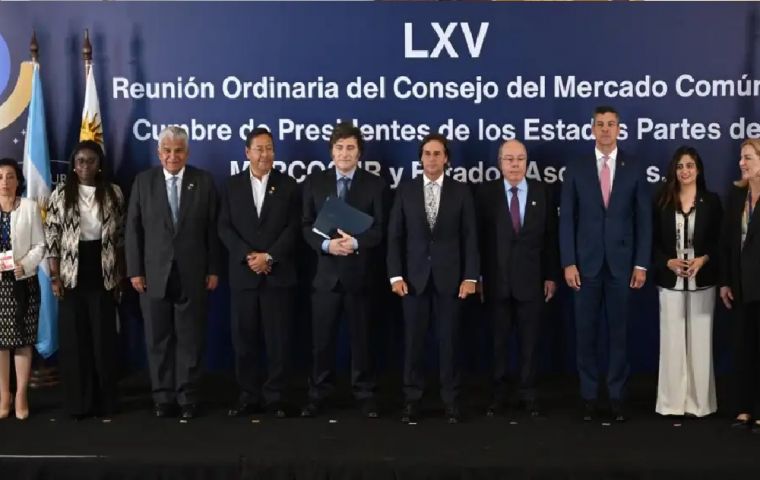MercoPress. South Atlantic News Agency
Milei takes over Mercosur's rotating presidency
 Lula stayed away from the traditional family picture as payback for Milei's similar attitude during the G20 Summit in Rio de Janeiro last month
Lula stayed away from the traditional family picture as payback for Milei's similar attitude during the G20 Summit in Rio de Janeiro last month In one of the last significant moments of his five-year term ending Feb. 28, Uruguay's President Luis Lacalle Pou handed over the rotating chair of the Southern Common Market (Mercosur) to his Argentine colleague Javier Milei as the bloc's 65th Leader's Summit concluded in Montevideo.
In his acceptance speech, the Libertarian head of State insisted on statements he had made earlier Friday regarding Mercosur's protectionism and advocating for reforms allowing member states to seek one-on-one trade agreements with other countries or groups.
Milei also said that he would work for “fewer obstacles to trade inside,” “more freedom to trade outside,” and “more cooperation for the persecution of drug trafficking,” especially in the Tri-Border area (Argentina, Paraguay, and Brazil).
“The reality is that we have two paths: either we accept that Mercosur does not work and we dissolve it, which is not the will of the Argentine government, or we adapt it to be functional to the current needs of its members. This second alternative, of course, requires intellectual honesty and willingness to change,” Milei argued.
“My Economy Minister said a few days ago that there are moments when history changes, we are used to reading about those moments in the textbook. Then we assume that we cannot live it, that the present is static, and that making history is something that always happens in the past. And yet, the great history was made and it was made by mere men like us, not by gods. That is precisely the freedom of man: to be able to leave the determinism of our past and do something different, to be the architects of our own destiny. I would like to invite you all to exercise that freedom, which is the most precious gift we have been given, to dare to leave determinism behind and make history great once again,” the Argentine President went on.
“While the responsibility for Argentina's failure lies mostly on decades of destructive economic policy, Mercosur and its restrictions have been a stumbling block for Argentines,” he also noted.
In the late 1980s, with a “completely fractured” world after the Cold War and ideological polarization, the South American bloc emerged as a way to seek the integration of its countries' markets, eliminating tariffs, bureaucracies, and double taxation, he explained.
“A common external tariff system was proposed to try to protect our countries' industry, believing that this would bring a benefit to our citizens. Unfortunately, the road to hell is paved with good intentions”, he added. But from his Libertarian viewpoint, he was not surprised that the outcome “has been the opposite of what was intended” after the common external tariff made imports more expensive, thus affecting local industries importing inputs, which closed countless trade channels.
“Both because of the rigidity of the common external tariff and the innumerable tariff barriers that we have invented over the years, both Mercosur's trade with the world and intra-Mercosur trade have deteriorated,” Milei pointed out.
After the ceremony, Brazil's President Luiz Inácio Lula da Silva was nowhere to be found, leaving Foreign Minister Mauro Vieira to appear in the traditional family photo. Lula's attitude is believed to have been as payback for Milei's no-show for the G20 picture last month in Rio de Janeiro.




Top Comments
Disclaimer & comment rulesCommenting for this story is now closed.
If you have a Facebook account, become a fan and comment on our Facebook Page!